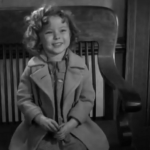 |
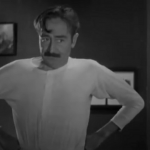 |
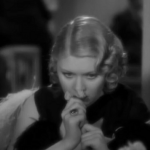 |
| Marky Shirley Temple |
Sorrowful Jones Adolphe Menjou |
Bangles Carson Dorothy Dell |
| Released by Parmount | Directed By Alexander Hall |
||
Proof That It’s Pre-Code
- “Clothes don’t mean a thing!”
“Yeah, I hear they even get married in those nudist colonies!”
- “All I know, boss, is that I’m supposed to be a fairy!”
- The titular kid’s dad commits suicide. … off-screen. … It’s a Shirley Temple movie! What do you want from me?!
Little Miss Marker: Fairy Tales
“Daddy said there’s nobody named God!”
It was back around Christmas time when I noticed that a set of Shirley Temple movies would be on sale over on Amazon. Knowing I’d be hitting a chunk of them at some point for this site, I turned to my loving wife: “Would you ever watch a Shirley Temple movie with me?”
“Well, it depends,” she said thoughtfully. “I feel like watching one of her movies is something I’d have to plan for. Like, years in advance.”
I don’t necessarily disagree. The extensive filmography of one of that most infamous of child stars is daunting, with not the least reason being that her films blur together fairly quickly. Little Miss Marker is her first starring role (but her 24th screen credit by age 6!) and shows the Temple formula already in full swing: cute kid. Bosses people around. Everyone learns not to be so uptight and, for the love of god, give the kid whatever she wants. A couple of songs and a few dances and everyone goes home happy.
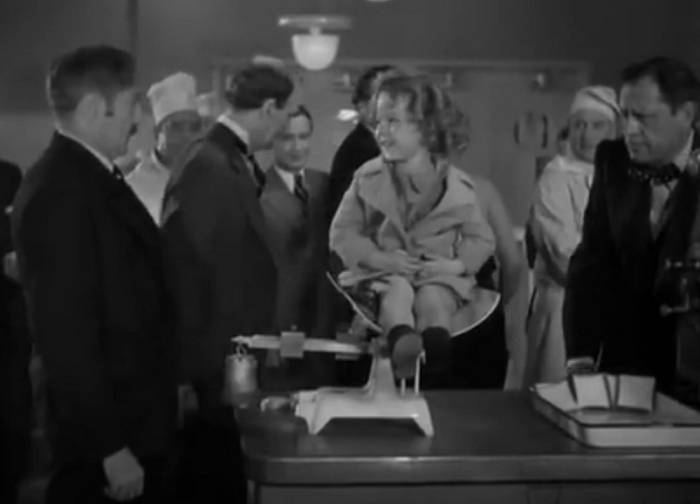
Forty kilos of pure Temple, man.
It’s hard for someone who likes films that look at complicated lives and sophisticated ideas to work themselves into much of a frenzy for Temple’s G-rated fairy tales. They’re the product of a more conservative time, a backlash to the kinds of films this blog celebrates. Little Miss Marker is part of the opening volley; Temple herself would win a special Oscar statuette for 1934 to celebrate just how un-fucking-believably adorable she was. In terms of Pollyanna film making, this one makes Frank Capra’s Lady for a Day look like Howard Hawks’ Scarface.
Please don’t take me for a total monster though: Shirley Temple is an excellent little actress, and it’s completely understandable why audiences would go goo-goo for such a sweet smile. Her films are about recapturing innocence, of cynical world-weary men and women being shown that their problems are really only surface deep– a fantasy that Depression-era audiences can’t be blamed for buying into, especially with the skillful Ms. Temple beaming from the poster.
In terms of plot, Little Miss Marker concerns a gambler kingpin named Steve running crooked pony races. One of his lackeys, Sorrowful Jones, owns a gambling house. One client is too poor to put down some money, and instead leaves his young daughter as his mark– “A doll like that is worth twenty bucks any way you look at it,” Sorrowful notes. When the father loses the bet, he commits suicide, and Sorrowful takes control of the little girl now nicknamed Marky.
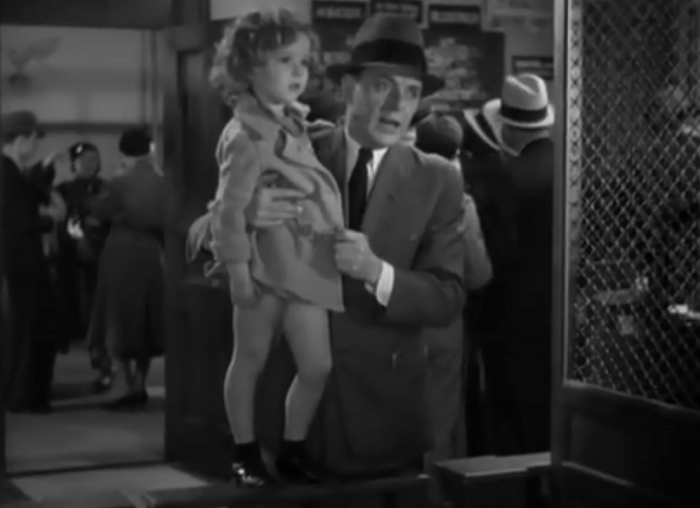
Uh, Miss Temple, you seem to have forgotten to put your pants on.
Marky leads a rich inner life, fantasizing that all around her are really members of King Arthur’s table. The various mugs and palookas who work with Sorrowful only reinforce this when they give her a horse as a present. Of course, that horse is hers so it can run in the next race and win big for Steve, even though he plans on killing it with a drug overdose to ensure its victory. (In this way, Little Miss Marker is a lot like Sporting Blood minus the blood.)
It’s not as simple as that, as Steve’s girlfriend Bangles falls for Sorrowful, and Sorrowful is stuck taking care of a precocious tot who soon likes hearing about the ponies and declares her old childish fantasies as ‘sissy stuff’. Bangles and Sorrowful are mortified since she’s become hard and cold like them, so the only way to rectify this is to have everyone dress in medieval outfits and put on a show for her.
Steve returns from a trip out west and scares the horse that Marky is sitting upon, sending the tyke crashing to the ground and rushed to the hospital. Will Marky die?
… uh, no, in case you were worried. Since the film heavily implies that Marky’s innocence is tied directly into God’s wishes, it couldn’t get away with that. Especially since part of God’s plan to reform these criminals was apparently to kill this girl’s entire family to bring this transformation about.
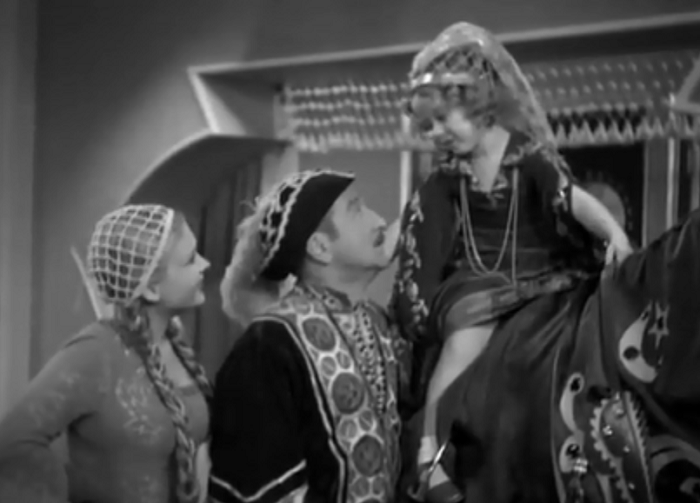
“My knight in shining… uh… in a goofy hat.”
There are two constant things that come up with discussing Shirley Temple films (besides how cute she is, naturally), with those being the way the films sexualize Temple and the portrayal of black characters in her films. On the former, I’ll skip commenting. Besides The Self Styled Siren begging people to lay off it in her recent obituary of Temple, I think that conversation will be more appropriate whenever I discuss Shirley’s roles in the disturbing “Baby Burlesks” series (click here to read about ’em on Wikipedia)– a series which I’ll cover just as soon as I’m sure I won’t be arrested for watching them.
On the other point, though, the film’s racial content is rather unpleasant in retrospect, as it would be for many of Temple’s flicks. As part of the general tendency of films of the mid-30s to try and completely neuter the black male, we get a handful of colored men for Marky to reign over. One is Sorrowful’s slow-witted, slow-talking assistant; when he attends a night club later and starts dancing, he’s laughed off the floor by the sophisticated white audience. And while Bangles is singing on a piano, two black kids bellboys pull her and the band around the floor like pack mules. The kicker, too, is that it turns out that Bangles’ colored maid is actually a spy for the mob boss, selling out the film’s romantic duo to certain death. No breaks here for anyone a shade darker than Shirley.
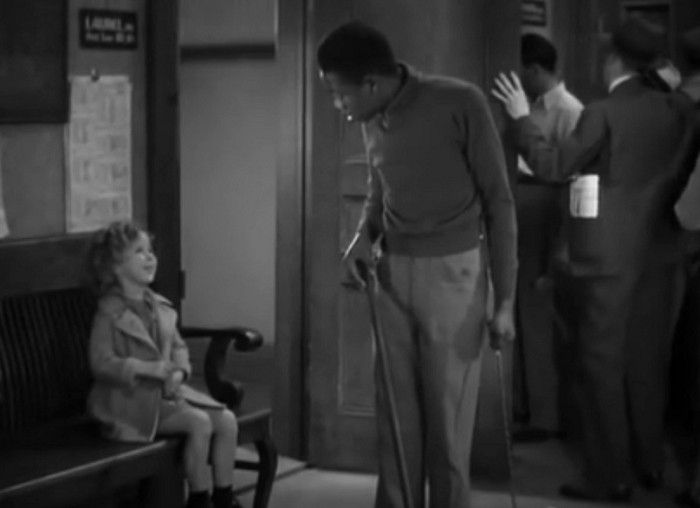
Here’s little Shirley Temple, showing everyone the right way to wield total racial hegemony.
Those two topics may make Little Miss Marker sound more interesting than it is, even if Adolphe Menjou’s wizened leer grows uncomfortable once or twice. The film is a calculated piece of schmaltz, where the movie takes time to stop and let Dorothy Dell and Shirley Temple duet to a sweet ditty called, “Laugh You Son of a Gun!” High art it ain’t.
This may be a good film for small children, those who aren’t very impressionable but who may still be susceptible to Temple’s charms. Anyone whose age has entered the double digits, though, may come down with diabetes.
The only reason Little Miss Marker ranked “Indifferent” from me is because its too difficult to actively dislike; tedium is its ally in this regard. As an example of the new, dawning reality of a Production Code-ified Hollywood in 1934, though, this remains a potent harbinger.
Gallery
Hover over for controls.
Trivia & Links
- Mordaunt Hall at The New York Times is gushing over this one. He goes so far to note:
Tiny Shirley Temple is a joy to behold and her spontaneity and cheer in speaking her lines are nothing short of amazing. Mr. Menjou has given much fine acting to pictures, but he has never done anything better than his characterization of Sorrowful Jones.
- Cliff over at Immortal Ephemera delves into the life of co-star Dorothy Dell and also reviews the three (3) movies she appeared in before her untimely death after this film was released.
- TCMDB goes through Temple’s audition, the filming, as well as the film’s ultimate financial fate:
Upon its release, Little Miss Marker was a major box office hit: “Temple Holds ‘Em Three Weeks,” blared the headlines, referring to an over-$100,000 gross at the Paramount in New York City during that brief time period. Shirley was indeed a bona fide star; within days, her salary catapulted from $150 a week to over $1250. She would be awarded a special honorary Oscar in the same year, “In grateful recognition of her outstanding contribution to screen entertainment during the year 1934.”
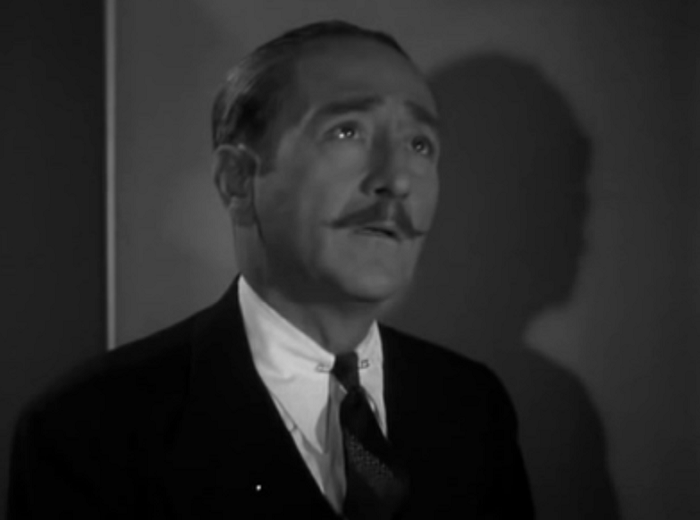
“Are you there, God? It’s me, Adolphe. Unless you’re a dirty commie.”
- Some stills and posters over at Dr. Macro.
- I mentioned above about The Self-Styled Siren being sick of talking about the sexuality of Temple’s films, and she’d written before about how Graham Greene (writer of The Third Man and dozens of other screenplays) dabbled in film criticism. He managed to get hit with a lawsuit from Temple’s family for describing how he viewed her allure in very-non-G-rated terms, and it’s worth a read, if just because it’s so unrepentantly catty.
Awards, Accolades & Availability
- This film appeared in the Wikipedia List of Pre-Code Films.
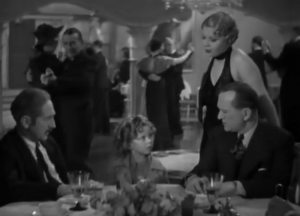 |
Comment below or join our email subscription list on the sidebar!Home | All of Our Reviews | What is Pre-Code? |




5 Comments
jameswharris · April 11, 2014 at 2:47 am
My wife loves Shirley Temple movies, so I see a bit of them once in a while. Little Miss Marker sounds familiar, but that’s because I saw the Bob Hope remake years ago. It might be worthwhile to read the original Damon Runyon tale since it was used at least three times to make a movie.
Danny · April 11, 2014 at 6:57 pm
I actually caught Hope’s The Lemon Drop Kid, also based on a Runyon tale, and, uh, yeah, no, I think I’ll be okay. My mom loved Shirley Temple movies, but I think we stopped watching them when she found out my sisters liked other movies more. Thank goodness.
justjack · April 12, 2014 at 6:25 am
Wait, What? You didn’t like The Lemon Drop Kid? Hmm. [confused bemusement]
Anyway, re the movie at hand, you’re probably right about it, but I do give it an extra point for being based on a Damon Runyon story, and and extra half a point because it’s neat to see Adolphe Menjou in his earlier days.
Danny · April 15, 2014 at 3:04 pm
I had no idea who Runyon was before I watched Lemon Drop Kid, nor that he was well known. If you like Temple, this may be worth a shot, though I don’t think there’s anything in the world that could make me revisit it.
lovelyt26 · March 15, 2019 at 3:58 pm
I love this film. It’s one of my favorite Shirley Temple movies. Even though I enjoy her films from Fox and later 20th Century Fox, I feel as though her Paramount films, when on loan from Fox had a darker undertone and are more interesting. I sometimes wonder what would have happened if she stayed at Paramount.
Comments are closed.